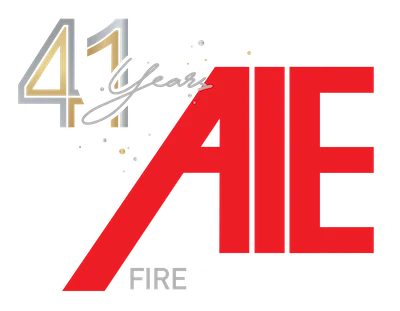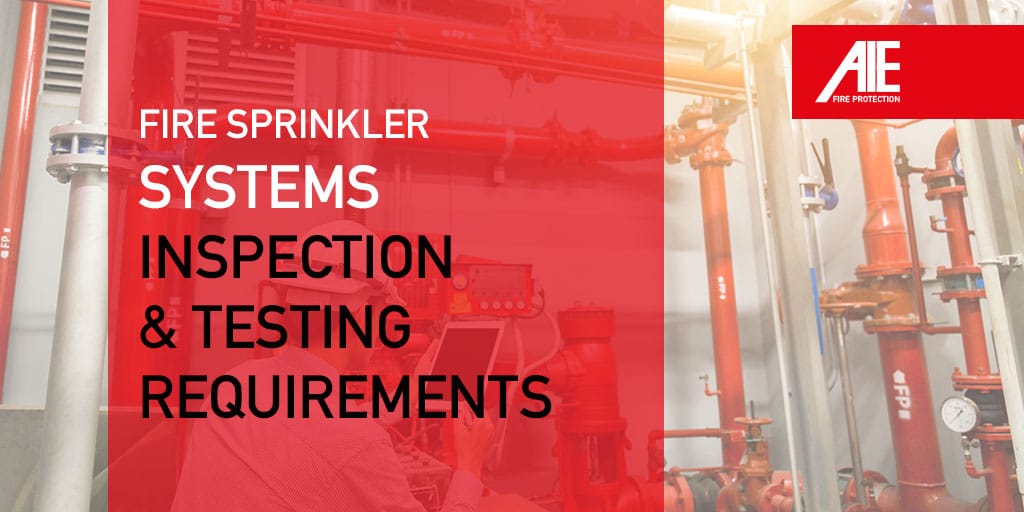Your commercial building’s automatic fire sprinkler system is the first line of defense when fire breaks out, so they’re an important fire safety measure in your building. Fire sprinklers can control a fire and keep it small while protecting occupants from harm and saving your business. So, how do you know your sprinkler systems will work when needed? How often should you have sprinkler system inspections? You must stay up to date on fire sprinkler testing and fire sprinkler maintenance.
Experts ensure they’re in working order with regular fire sprinkler inspections, as well as follow maintenance and testing timelines. When you follow the required fire sprinkler system inspections and testing, as well as sprinkler system maintenance schedules set by the National Fire Protection Association (NFPA) and your local Authorities Having Jurisdiction (AHJ), you ensure your system operates as it was designed to minimize the risk of damage and loss of life should there ever be a fire. Familiarize yourself with the fire system inspection requirements below.
- How Often Do You Need Fire Sprinkler Inspections?
- Fire Sprinkler Testing Timelines
- Fire Sprinkler System Maintenance Schedules
- How Routine Inspections Can Minimize Damage and Save Lives
To stay on top of mandatory fire sprinkler inspections and testing, download our free, printable fire sprinkler testing table at the bottom of this article. The resource includes a timeline for all fire sprinkler inspection and testing requirements – annual, semi-annually, quarterly, monthly and other considerations.
How Often Do Sprinkler Systems Need to Be Inspected?
The adopted codes require all commercial entities and nonprofit organizations follow NFPA 25 Standard for the Inspection, Testing, and Maintenance of Water-Based Fire Protection Systems. Each local AHJ may also have additional fire sprinkler inspection and testing requirements. Be sure to check with your area’s fire marshal for those local codes.
The NFPA25 Standard puts forth weekly, monthly, quarterly and annual fire sprinkler system inspection requirements:

Monthly, Quarterly, & Annual Fire Sprinkler Inspections
A designated staff member who is trained in the proper NFPA25 Standards and local code compliance may perform weekly fire sprinkler inspections. This person should check for normal air and water pressure on the dry, pre-action, and deluge systems gauges. He or she will also make sure control valves are not leaking or locked, that they are sealed and open.
During monthly inspections, your on-site fire protection person should look at the wet pipe systems gauges, confirm water pressure is maintained and that there are no signs of physical damage. Alarm valves should also be inspected for physical issues.
The quarterly, annual, and every five- and ten-year fire sprinkler system inspection, along with system maintenance, testing, and repairs must be performed by a licensed fire protection technician. Comprehensive records must be retained for a minimum of one year, along with the ability to produce these maintenance records when requested. It is recommended to use fire sprinkler inspection companies that can service all your locations so records are easily accessible from one entity. Keeping these inspections up-to-date helps you avoid fire safety fails & code violations.

When to Perform Fire Sprinkler Maintenance & Testing
In addition to regular inspections, fire sprinkler system maintenance and testing are also vital pieces of the overall process. A test is a more involved physical check to make sure the fire sprinkler system not only looks like it’s functioning, but actually works as it should. Routine sprinkler maintenance and repair are critical to keep your fire sprinklers in good working condition. Be sure to do your research to find the best fire sprinkler maintenance companies to ensure your business is safe.
Fire Sprinkler Testing Timeline:
Quarterly inpsections, semi-annual, and annual fire sprinkler system testing and tagging must be performed and documented by a licensed technician in accordance with NFPA25 and your AHJ. Inspection tags for fire sprinkler systems must be current.

Fire Sprinkler System Maintenance Timeline:
Fire sprinkler system maintenance and testing is a vital step in the process that should never be skipped. In fact, without proper fire sprinkler maintenance, your fire sprinkler system may appear in working order and test okay once a year, but without lubrication, tightening of loose bolts, cleaning, and clearing lines, your fire sprinklers may experience a shortened life span and may not work during a fire. Be sure to follow the below sprinkler maintenance schedule to ensure your systems are working.
- As needed: repair and maintain parts that appear questionable during visual inspections/testing.
- Annually: lubricate control valves, clean interior of the pre-action/deluge valve and dry pipe valves; repair/replace parts as needed.
- Other: Examine systems for internal obstructions where conditions exist that could cause obstructed piping. Correct if it has not been corrected or the condition is one that could result in future obstruction of piping despite previous flushing procedures.

Minimize Damage & Save Lives: Sprinkler System Inspection Companies
If you find an issue during fire sprinkler inspections or suspect that something may be wrong at any time, contact a reliable, experienced fire protection company, like AIE, as soon as possible for fire sprinkler testing.
We have a nationwide network of highly skilled contractors and technicians with factory training, certification, and licensure who can be there fast to ensure your fire sprinklers and water supply systems are in working order and comply with NFPA25 and NFPA 291 standards, local codes, and requirements. We offer inspections, testing and preventative maintenance!
We also offer:
- Analysis and categorization of post-inspection recommendations logged in a database to assist with future solutions, cost reductions, and priorities.
- Easy access to your company’s fire compliance information via digital inspection forms and electronic document management.
- Nationwide new build, existing facility, and third-party inspections, design, service, maintenance, and repair of all your fire protection, fire sprinkler, and water systems.
- 24/7/365 emergency services handled by our in-office, trained AIE-staff – no random call center.
AIE is one of the most established WBENC fire protection companies in the country. Since 1983, we have been providing unsurpassed fire inspection and protection solutions to some of the nation’s largest retailers and corporate partners, some for over 25 years.
You don’t need to know how to test fire sprinkler systems yourself! Contact AIE to learn how we help minimize fire damage risk with worry-free, reliable sprinkler systems, fire suppression systems, and fire sprinkler inspections in all nationwide locations of restaurants, big box stores, retail shops, hotels, manufacturing plants, or other commercial facilities. We’re one of the best fire sprinkler maintenance companies in the nation! 800-892-9863
Information posted in our blog is merely for educational and informational purposes. While the information has been verified to the best of our abilities, we cannot guarantee its total accuracy, and it should not be considered legally binding advice. This blog is not intended as a substitute for professional advice, and should you decide to act upon the information, you do so at your own risk.


Recent Comments